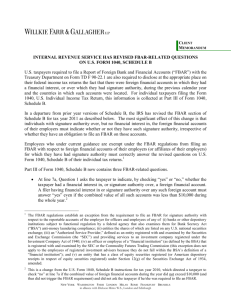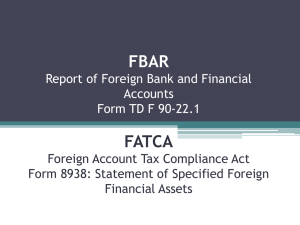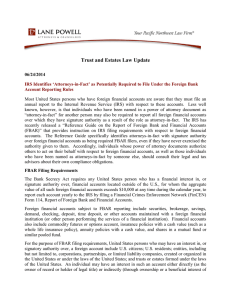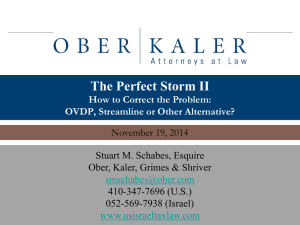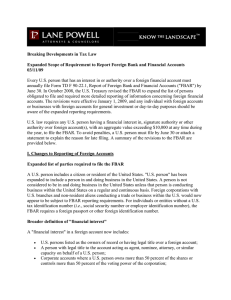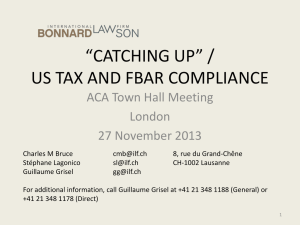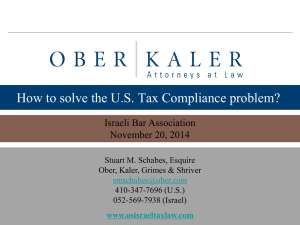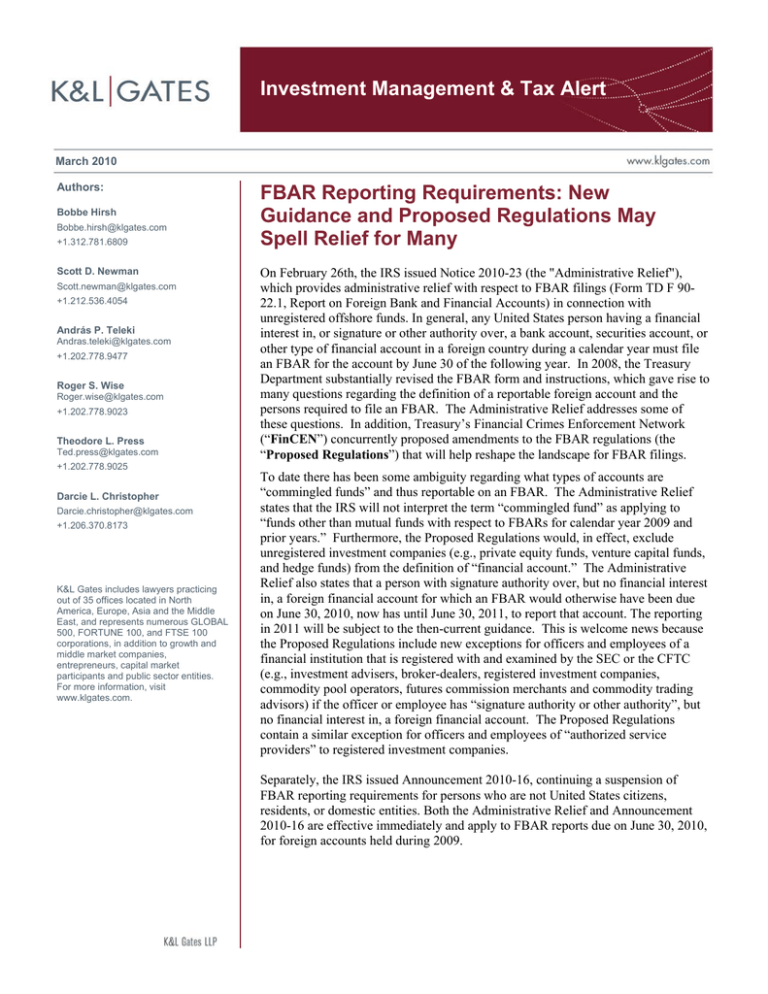
Investment Management & Tax Alert
March 2010
Authors:
Bobbe Hirsh
Bobbe.hirsh@klgates.com
+1.312.781.6809
Scott D. Newman
Scott.newman@klgates.com
+1.212.536.4054
András P. Teleki
Andras.teleki@klgates.com
+1.202.778.9477
Roger S. Wise
Roger.wise@klgates.com
+1.202.778.9023
Theodore L. Press
Ted.press@klgates.com
FBAR Reporting Requirements: New
Guidance and Proposed Regulations May
Spell Relief for Many
On February 26th, the IRS issued Notice 2010-23 (the "Administrative Relief"),
which provides administrative relief with respect to FBAR filings (Form TD F 9022.1, Report on Foreign Bank and Financial Accounts) in connection with
unregistered offshore funds. In general, any United States person having a financial
interest in, or signature or other authority over, a bank account, securities account, or
other type of financial account in a foreign country during a calendar year must file
an FBAR for the account by June 30 of the following year. In 2008, the Treasury
Department substantially revised the FBAR form and instructions, which gave rise to
many questions regarding the definition of a reportable foreign account and the
persons required to file an FBAR. The Administrative Relief addresses some of
these questions. In addition, Treasury’s Financial Crimes Enforcement Network
(“FinCEN”) concurrently proposed amendments to the FBAR regulations (the
“Proposed Regulations”) that will help reshape the landscape for FBAR filings.
+1.202.778.9025
Darcie L. Christopher
Darcie.christopher@klgates.com
+1.206.370.8173
K&L Gates includes lawyers practicing
out of 35 offices located in North
America, Europe, Asia and the Middle
East, and represents numerous GLOBAL
500, FORTUNE 100, and FTSE 100
corporations, in addition to growth and
middle market companies,
entrepreneurs, capital market
participants and public sector entities.
For more information, visit
www.klgates.com.
To date there has been some ambiguity regarding what types of accounts are
“commingled funds” and thus reportable on an FBAR. The Administrative Relief
states that the IRS will not interpret the term “commingled fund” as applying to
“funds other than mutual funds with respect to FBARs for calendar year 2009 and
prior years.” Furthermore, the Proposed Regulations would, in effect, exclude
unregistered investment companies (e.g., private equity funds, venture capital funds,
and hedge funds) from the definition of “financial account.” The Administrative
Relief also states that a person with signature authority over, but no financial interest
in, a foreign financial account for which an FBAR would otherwise have been due
on June 30, 2010, now has until June 30, 2011, to report that account. The reporting
in 2011 will be subject to the then-current guidance. This is welcome news because
the Proposed Regulations include new exceptions for officers and employees of a
financial institution that is registered with and examined by the SEC or the CFTC
(e.g., investment advisers, broker-dealers, registered investment companies,
commodity pool operators, futures commission merchants and commodity trading
advisors) if the officer or employee has “signature authority or other authority”, but
no financial interest in, a foreign financial account. The Proposed Regulations
contain a similar exception for officers and employees of “authorized service
providers” to registered investment companies.
Separately, the IRS issued Announcement 2010-16, continuing a suspension of
FBAR reporting requirements for persons who are not United States citizens,
residents, or domestic entities. Both the Administrative Relief and Announcement
2010-16 are effective immediately and apply to FBAR reports due on June 30, 2010,
for foreign accounts held during 2009.
Investment Management & Tax Alert
Although these developments would limit the
number and types of persons and entities covered by
the FBAR filing requirements, the Foreign Account
Tax Compliance Act (“FATCA”) bill pending
before Congress would require individuals to report
certain financial assets on their tax returns and
would impose a 30% withholding tax on certain
U.S.-source payments to foreign financial entities,
including hedge funds and private equity funds,
unless the foreign financial entity shares information
regarding certain U.S. investors and account holders
with the IRS. Future client alerts will provide more
information on FATCA.
Brief Summary of Administrative Relief
and Announcement 2010-16
Administrative Relief. Notice 2010-23 provides
administrative relief for persons having signature
authority over, but no financial interest in, a foreign
financial account and includes only mutual funds in
the definition of “commingled funds” for purposes
of FBAR reporting for calendar year 2009 and prior
years. Specifically, persons with signature authority
over, but no financial interest in, a foreign financial
account for which an FBAR would otherwise have
been due on June 30, 2010, now have until June 30,
2011, to report that account. That deadline applies to
FBARs reporting foreign financial accounts over
which a person has signature authority, but no
financial interest, for 2010 and prior calendar years.
The Administrative Relief also states: “When
completing an FBAR that is subject to the extension
provided [for persons with signature authority],
persons must adhere to FBAR guidance in effect at
the time the FBAR is filed.” Furthermore, the
Administrative Relief limits the definition of
“commingled funds” to mutual funds. Finally, the
Administrative Relief further states: “The IRS has
determined that it will not apply its enforcement
authority adversely in the case of persons with a
financial interest in, or signature authority over, any
other foreign commingled fund with respect to that
account for calendar year 2009 and earlier calendar
years.”
Announcement 2010-16. Announcement 2010-16
continues a suspension of FBAR reporting
requirements for persons who are not United States
citizens, residents, or domestic entities (i.e., a
partnership, corporation, trust, or estate) that had
previously been set forth in Announcement 2009-51,
2009-25 I.R.B. 1105. This suspension applies so
that foreign persons are not required to file FBAR
forms due on June 30, 2010, which are applicable to
interests held in foreign accounts during 2009.
The Proposed Regulations
On February 26, 2010, FinCEN published the
Proposed Regulations, which would make changes
to the Bank Secrecy Act regulations on FBAR
reporting, together with related modifications to the
instructions to the FBAR form. Although, as noted
below, the Proposed Regulations provide helpful
guidance to taxpayers, a number of issues remain
unsettled.
The following are some of the noteworthy changes
in the Proposed Regulations:
Definition of “United States Person” and Types of
Reportable Accounts. In an effort to more clearly
delineate both the scope of individuals and entities
required to file an FBAR and the types of accounts
for which such reports are required, the Proposed
Regulations provide a definition of “United States
person” and redefine the types of foreign accounts
subject to FBAR reporting.
•
Definition of “United States Person.”
Considerable uncertainty resulted when the
2008 FBAR instructions included certain
foreign persons as United States persons
required to file an FBAR. The Proposed
Regulations provide that only a United States
citizen, resident, or domestic entity (including,
for example, a corporation, partnership, trust, or
limited liability company) is treated as a United
States person for FBAR filing purposes and, as
a result, clarify that foreign persons are not
required to file an FBAR. The definition of
“United States person” specifically includes a
limited liability company that has only one
member and thus is disregarded as an entity
separate from its owner for U.S. federal income
tax purposes. Thus, the Proposed Regulations
clarify that domestic LLCs generally, and LLCs
that are otherwise disregarded for those
purposes, are required to file an FBAR if they
have an interest in a foreign financial account.
•
Types of Financial Accounts. The Proposed
Regulations’ new general instructions to the
March 2010
2
Investment Management & Tax Alert
FBAR form would define “financial account” to
include a “securities, brokerage, savings,
demand, checking, deposit, time deposit, or
other account maintained with a financial
institution (or other person performing the
services of a financial institution).” The revised
instructions go on to state that a “financial
account” also includes “a commodity futures or
options account, an insurance policy with a cash
surrender value (such as a variable annuity or
whole life insurance policy), an annuity, and
shares in a mutual fund or similar pooled fund
(i.e., a fund with a regular net asset value
determination and redemptions).” The Proposed
Regulations specifically “reserve the treatment
of investment companies other than mutual
funds or similar pooled funds,” suggesting that
there may be future changes in this area.
Signature Authority over Accounts. The Proposed
Regulations generally expand exemptions for filing
the FBAR to include employees of registered
broker-dealers, investment advisers that provide
services to regulated investment companies, certain
other regulated entities, and U.S.-exchange-listed
foreign entities. The Proposed Regulations do not,
however, provide a similar exemption to employees
of a foreign bank that is subject to U.S. regulatory
supervision, and it thus remains unclear whether
such employees will be required to report client
accounts over which they have signature authority.
Although the Proposed Regulations provide helpful
guidance, they do not address many important
issues, and they leave several questions unanswered.
For example, although they provide exemptions for
certain categories of filers, including, for example,
employees of certain categories of entities with
signature authority over accounts, the Proposed
Regulations do not provide any type of filing
exemption for exempt organizations, including
pension funds, educational organizations, and
charitable organizations, or their employees. In
addition, the Proposed Regulations do not: (i) make
a comprehensive effort to avoid duplicative filings;
(ii) raise the $10,000 filing threshold; (iii) provide
for electronic filing of FBARs; (iv) treat an FBAR
as filed when mailed; or (v) provide for extending
the due date for filing an FBAR. Finally, the
Proposed Regulations do not state whether they
would be effective prospectively or retroactively.
Comments on the Proposed Regulations are due by
April 27, 2010.
Circular 230 Notice
To ensure compliance with requirements imposed by the IRS, we
inform you that any U.S. federal tax advice contained in this
communication (including any attachments) is not intended or written to
be used, and cannot be used, for the purpose of (i) avoiding penalties
under the Internal Revenue Code or (ii) promoting, marketing or
recommending to another party any transaction or matter addressed.
Reporting Obligations of Certain Trust
Beneficiaries, Participants in Retirement Plans, and
IRAs. The Proposed Regulations include a
provision providing that beneficiaries of a trust are
not required to file an FBAR in respect of foreign
accounts held by a trust as long as an FBAR is filed
by the trust or its trustee or agent. In addition,
participants in retirement plans and individual
retirement accounts for which FBARs are filed are
exempted from the FBAR reporting obligations in
respect of accounts held by those entities.
Addition of Anti-Avoidance Rule. The Proposed
Regulations provide an anti-avoidance rule so that
any person who causes an entity to be created for the
purpose of evading the FBAR reporting
requirements is treated as having a financial interest
in any reportable account held by the entity.
March 2010
3
Investment Management & Tax Alert
Anchorage Austin Beijing Berlin Boston Charlotte Chicago Dallas Dubai Fort Worth Frankfurt Harrisburg Hong Kong London
Los Angeles Miami Moscow Newark New York Orange County Palo Alto Paris Pittsburgh Portland Raleigh Research Triangle Park
San Diego San Francisco Seattle Shanghai Singapore Spokane/Coeur d’Alene Taipei Tokyo Washington, D.C.
K&L Gates includes lawyers practicing out of 35 offices located in North America, Europe, Asia and the Middle East, and represents numerous
GLOBAL 500, FORTUNE 100, and FTSE 100 corporations, in addition to growth and middle market companies, entrepreneurs, capital market
participants and public sector entities. For more information, visit www.klgates.com.
K&L Gates is comprised of multiple affiliated entities: a limited liability partnership with the full name K&L Gates LLP qualified in Delaware and
maintaining offices throughout the United States, in Berlin and Frankfurt, Germany, in Beijing (K&L Gates LLP Beijing Representative Office), in
Dubai, U.A.E., in Shanghai (K&L Gates LLP Shanghai Representative Office), in Tokyo, and in Singapore; a limited liability partnership (also named
K&L Gates LLP) incorporated in England and maintaining offices in London and Paris; a Taiwan general partnership (K&L Gates) maintaining an
office in Taipei; a Hong Kong general partnership (K&L Gates, Solicitors) maintaining an office in Hong Kong; and a Delaware limited liability
company (K&L Gates Holdings, LLC) maintaining an office in Moscow. K&L Gates maintains appropriate registrations in the jurisdictions in which its
offices are located. A list of the partners or members in each entity is available for inspection at any K&L Gates office.
This publication is for informational purposes and does not contain or convey legal advice. The information herein should not be used or relied upon
in regard to any particular facts or circumstances without first consulting a lawyer.
©2010 K&L Gates LLP. All Rights Reserved.
March 2010
4

